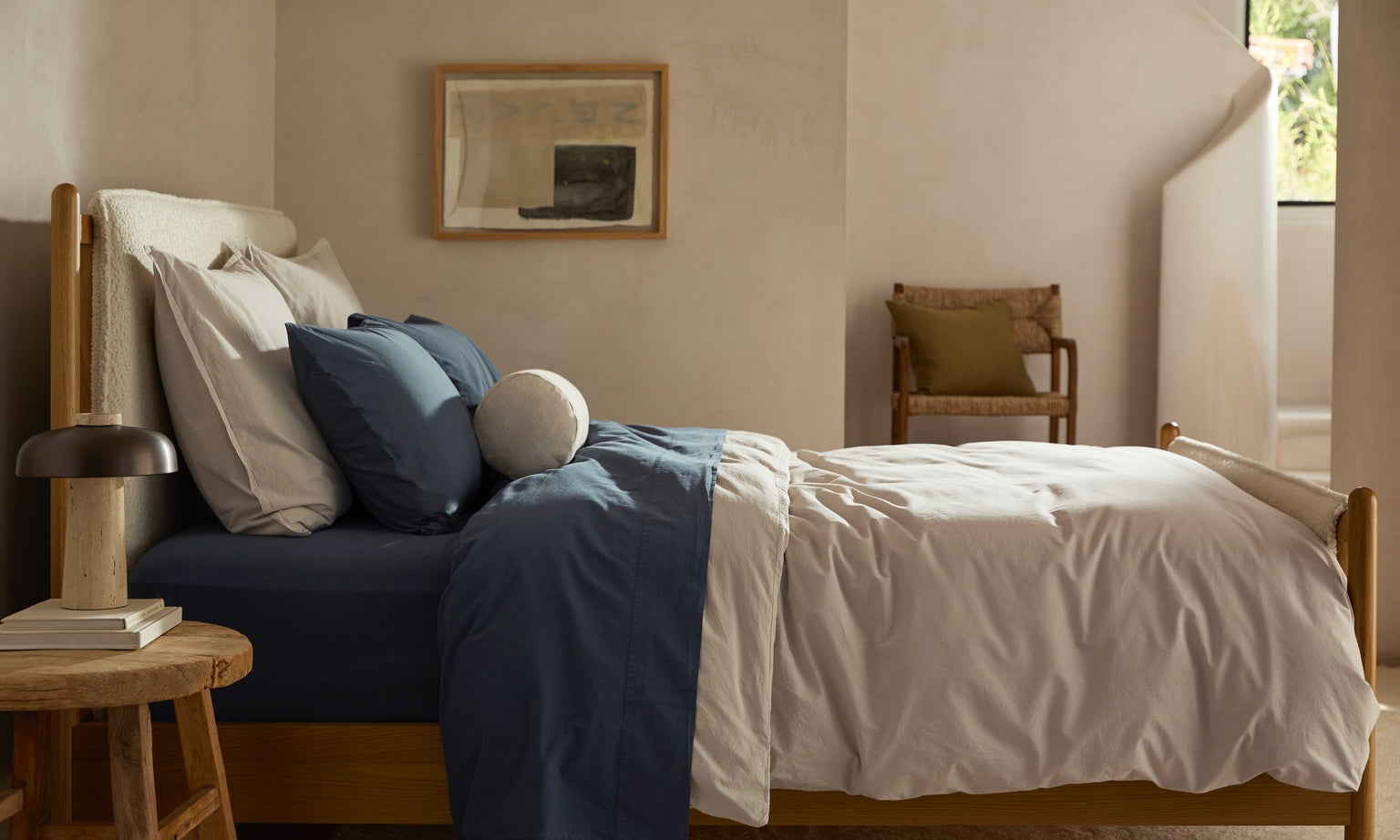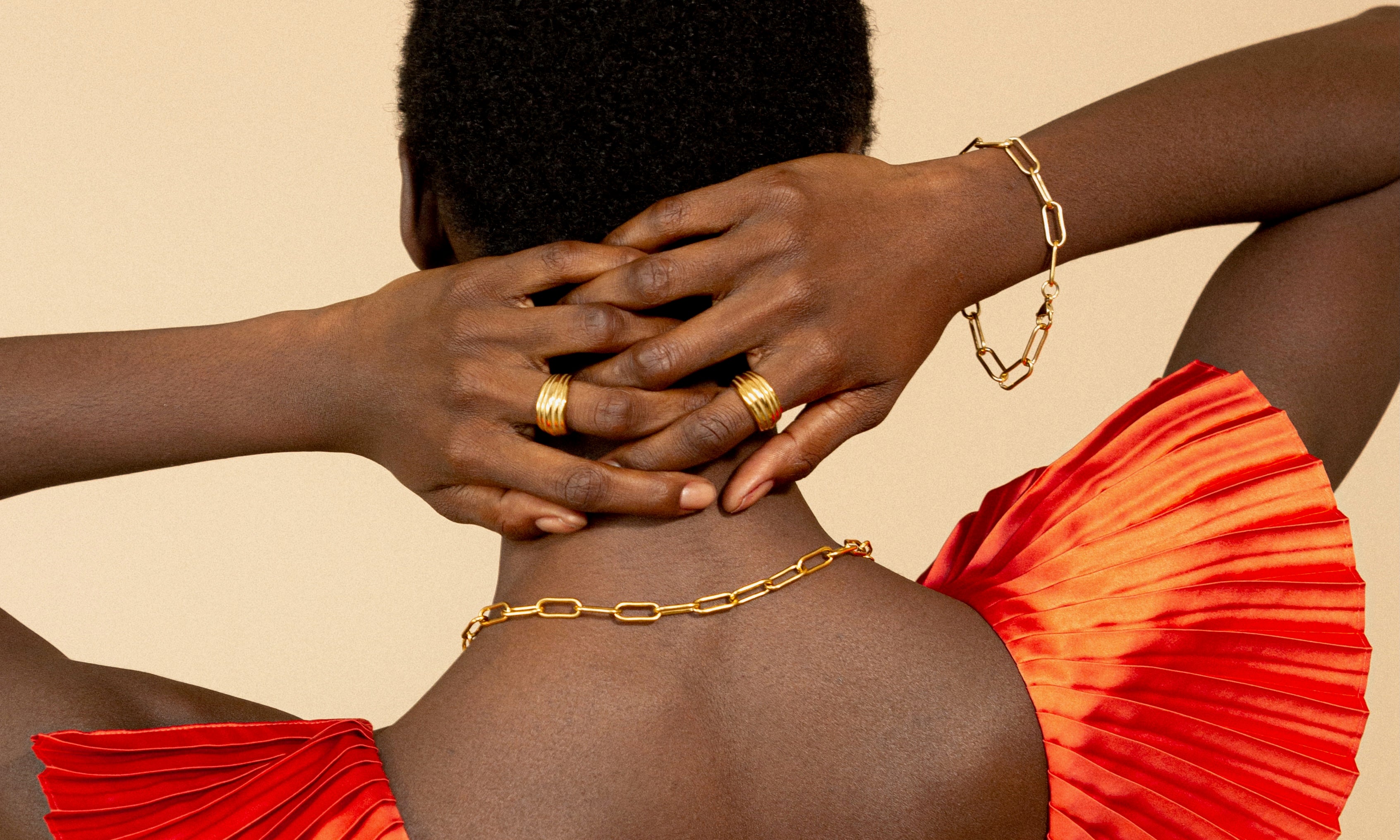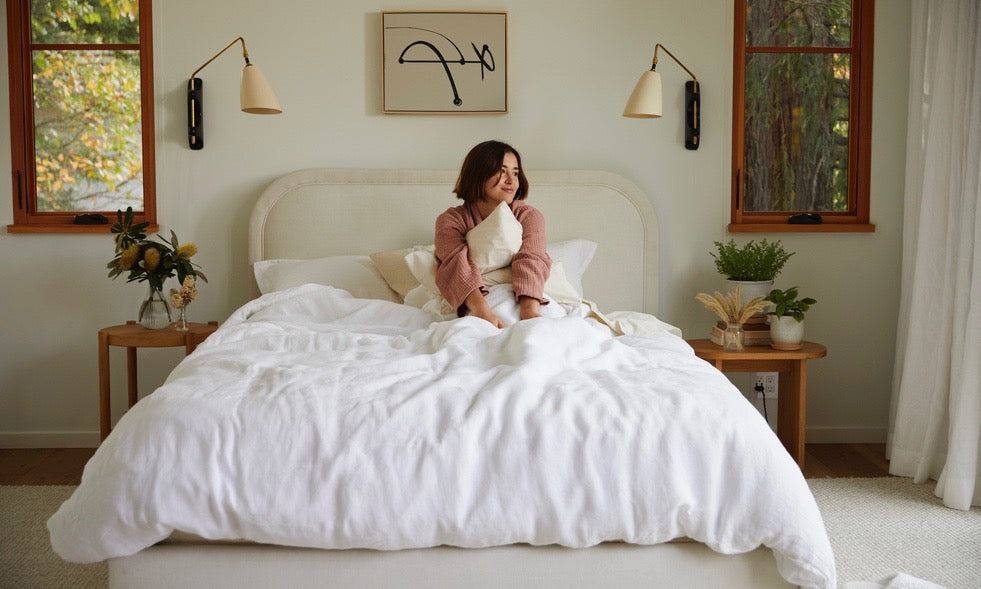
Percale vs Sateen vs Linen: What’s the Difference?
Wondering what fabric to cuddle up in tonight for your best sleep yet? We’ll show you the warp and woof in our percale vs sateen vs linen guide.
If you feel overwhelmed while shopping for sheets and other bedding, you’re certainly not alone! There are so many different materials to choose from and each one offers its own unique collection of benefits and considerations.
As you shop, you’re likely to encounter terms that you may have heard in the past but never really explored in any depth. For instance, many consumers see listings for sateen sheets and think of satin, or confuse percale and poplin. There’s a lot to keep straight!
Finding the ideal bedding fabric to suit your preferences is as easy as understanding the difference between each material. In this percale vs sateen vs linen guide, you’ll learn what each term means and how they vary, so you can purchase the luxury bedding of your dreams.
Understanding the Basics of Weave
Any time you shop for textiles, it's important to consider the type of weave the manufacturer used. While the raw materials of the fabric — like cotton, flax or bamboo — will affect the qualities of the finished piece, weave is also a very important factor.
What Do We Mean When We Talk About Weave?Woven fabrics begin as thread or yarn arranged in a particular pattern to create materials of different thicknesses and strengths. Just like artisans weave baskets by crossing natural reed or grass fibers over and under each other, bedding manufacturers form luxury fabrics by weaving luxury fibers together to form strong and soft textiles.
Each type of fabric features a unique weave technique and style. Some weaves are more open with a coarser texture, while others are tighter and feel softer. The way a weave looks and feels depends on the order the threads are overlaid.
Weave and Thread CountYou may associate a higher thread count with a softer or superior fabric but thread count is only one element of many that relates to material quality.
Thread count traditionally refers to the number of threads woven into each inch of fabric. Many consumers associate softer fabric with a higher thread count, but the quality of raw material and style of weave also affect softness and strength. That’s why percale vs sateen has more to do with weave than thread count.
Does Bed Sheet Thread Count Matter? Read our guide to find out.
What Is Percale?
Percale is a common type of weave with a pattern of one thread over and one thread under. Percale weave sheets can be made of cotton, polyester or other materials, so shopping for percale sheets tells you more about the type of weave than it does about the raw material used.
If you’re wondering what sheets are good for hot sleepers, percale sheets are always a great option because their weave stays cooler to the touch and feels crisp each time you roll over in bed. Look for percale sheets made with 100% long-staple Egyptian cotton fibers for exceptional durability and breathability.
Want to know more about percale bedding? See our blog: Percale: Know Your Bedding Like a Designer
What Is Sateen?
Sateen is a popular woven fabric that feels silky thanks to its particular style of weave. The weaving technique for sateen fabrics usually involves one thread under and three to five threads over. The result is a soft, moderate to tightly woven fabric that has a subtle shine and is resistant to wrinkles.
If you tend to feel cold in the night and want a very soft and cozy sheet, you’ll love sateen bedding and how it feels against your skin. Sateen sheets crafted from 100% long-staple Egyptian cotton offer an extra-luxurious feel.
Interested in all the ins and outs of this wonderful fabric? See our blog: Sateen: Know Your Bedding Like a Designer.
What Is Linen?
Linen is a more loosely woven fabric that’s usually made with flax instead of cotton. There are a few different weave styles used in various types of linen, but anytime you shop for flax linen bedding, you can expect a durable and breathable fabric that gets softer with each wash.
Linen bedding is ideal for any type of sleeper, keeping you cooler on hot nights and warmer on chilly ones. Shop for linen sheets made from pure European linen flax threads for a naturally light and airy texture with antimicrobial properties.
When deciding on percale vs linen, if you’re a hot sleeper, choose percale, but if your state has hot summers and chilly winters, linen is a flexible choice.
Would you like to know a little more about linen? See our guide: Linen: Know Your Fabric Like a Designer.
Exploring the Differences Between Sateen, Percale and Linen
Now that you understand a bit more about how weave and raw materials interact to create unique bedding textures, let's jump into comparing the pros and cons of sateen, percale and linen for your bedroom.
Percale vs Sateen for Sleeping ComfortPercale sheets are most comfortable for sleepers who get too warm in the night, for people who live in warmer climates and for those who prefer to use the same sheets and bedding year round.
Sateen sheets are ideal for sleepers with sensitive skin who want something that feels silky to the touch. The tighter sateen weave retains heat more effectively than percale, so if you tend to feel cooler in the night, you’ll be happy with sateen. If you’re a hot sleeper though, sateen may not be your best choice of bedding.
Whether you choose percale or sateen bedding, it’s important to look for products woven from high-quality, 100% long-staple Egyptian cotton. That way, the choice between percale and sateen is based more on your ideal texture and sleep styles rather than the raw material.
Percale vs Sateen for Durability and CareWhile percale will soften with each wash like a favorite, well-worn t-shirt, sateen may lose a bit of its satiny sheen over time. Sateen is also more prone to pilling than percale, so it’s important to pay close attention to the care instructions to prolong the quality and longevity of your bedding.
Both percale and sateen stand up well to normal use, provided you don’t overload your washing machine or use additives like fabric softener that can degrade the fibers over time.
Sateen is less prone to wrinkling than percale, so if you want a set of sheets that is wrinkle-free right out of the dryer, sateen is the better choice for you.
Both percale and sateen made from Egyptian cotton are relatively easy to care for, machine washable and you can pop them in the dryer as well.
To learn more, see our article: How to Wash, Dry and Properly Care for Sateen Sheets
Percale vs Linen for Sleeping ComfortPercale is made of Egyptian cotton while linen is made of European flax. Comparing percale and linen for comfort comes down to that difference in the raw material.
Flax linen is a great fabric for hot and sweaty sleepers because it’s very lightweight and moisture wicking without feeling wet to the touch. If you’ve ever worn a pair of linen pants or a linen shirt in a tropical climate, then you already know all about how cool and breathable linen fabric feels in the heat.
Part of why flax is so breathable is that the fibers are hollow. Thanks to the classic weave and a very lightweight raw fiber, you can always rely on the breathability of flax linen bedding.
If you find that even a breathable percale cotton leaves you feeling hot in the night, then flax linen may be the most comfortable selection.
Percale vs Linen for Durability and CareWith the right techniques, it’s easy to care for both percale and linen. As long as you use mild detergent and wash your bedding on a warm and gentle setting, both materials will last for a very long time.
Just like cotton percale, flax linen can shrink in the wash. However, if you follow the care instructions on the label you won’t have to worry about the fibers breaking down or shrinking.
Though cotton percale sheets are known for strength and durability, linen bedding made from extra long European flax fibers is also very strong and long lived.
Learn more in our guides:
How to Wash, Dry and Properly Care for Linen Sheets
How to Wash, Dry, and Properly Care for Percale Sheets
Popular Bedding Collections in Percale, Sateen and Linen
Once you’ve settled the percale vs sateen question, the linen, percale, and sateen bedding collections you’ll discover at Parachute are just what you need for your comfiest, coziest, best sleep yet. Because we place our focus on sourcing the best raw fibers and manufacturing high-quality materials, we can offer impressive and popular bedding collections in all three fabric styles.
Percale Bedding You’ll LoveWhether you’re looking for a set of percale sheets, duvet covers and shams or a bundle with everything you need to drape your bed in the cool, crisp comfort of percale cotton, you’ll find plenty of options to explore.
All of the choices in our percale collection are easily machine washable and designed to last. With a range of soothing and harmonious colors like raisin, moss, sand, putty, clay and cream, you can even mix and match your bedding to suit your style.
Sateen Bedding for a Silky TouchIf the silky, cozy feel of sateen is exactly what you’re looking for, you’ll love our sateen bed bundle, sheet sets and individual shams, duvet covers and sheet separates. Enjoy softness, durability and hotel-quality luxury with classic pastel colors like blush, white, sand and light grey.
Light and Airy LinenFor bedding design that instantly makes you feel like you’re living in a tropical paradise, linen is always a fantastic choice!
Explore bedding collections that suit any style or home design, from a beautifully textured Linen Bedding Set by Jake Arnold to a fresh, lightweight Linen Bed Bundle. Every option will have you looking forward to slipping between the sheets at the end of the day.
Consider adding key design accents like the Linen Stitch Throw or the Vintage Linen Bolster Pillow Cover for a bed that looks like it belongs in a magazine.
The linen bedding you’ll find at Parachute features pure European linen flax threads for a naturally light and airy texture with antimicrobial properties.
Comfort for Every Sleeper at Parachute
After exploring popular bedding options in percale, sateen and linen, you’ve probably begun to imagine the possibilities of comfortable sleep in a whole new way!
We’ve addressed all the important considerations when deciding on linen vs sateen, linen vs percale and percale vs sateen.
Whether you’re someone who likes to snuggle up in sateen, you're looking for the perfect year-round percale sheets or you’re hoping to add a dash of tropical luxury with linen, it's easy to find the exact style, color and texture of bed sheets for your perfect night’s sleep at Parachute.
Read on:
Sateen vs. Satin vs. Silk: What’s the Difference
Rearranging the Layout of Your Bedroom
How to Style Throw Pillows Like a Designer
How to Wash, Dry, and Care for Baby Blankets & Bedding
Brushed Cotton: Know Your Bedding Like a Designer
Best Organic Sheets: What to Look for in Sustainable Bedding
Best Organic Pillowcases: What to Look for in Sustainable Pillowcases & Shams
How to Recycle, Reuse, & Donate Old Sheets, Blankets, & Towels
What is GOTSⓇ Certified Organic Cotton?
What Is Oeko-Tex? Learn About This Textile Certification Standard
Best Sustainable Fabrics for an Eco-Friendly Home
Best Oeko-Tex Towels, Sheets, Shower Curtains, & More
How to Wash, Dry, & Care for Organic Cotton Sheets, Towels, & Clothes
How to Wash and Properly Care for Towels
Mattress Size and Dimensions Guide
Guide to Pillowcases & Shams: Everything to Know
Guide to Duvets & Duvet Covers: Everything to Know
Guide to Bed Sheets: Picking Your Perfect Sheet
What are Euro Shams & European Pillows? Sizes, Materials, & Styles
What is European Bedding? European Sheet Folding Styles & Fabrics to Know



































































